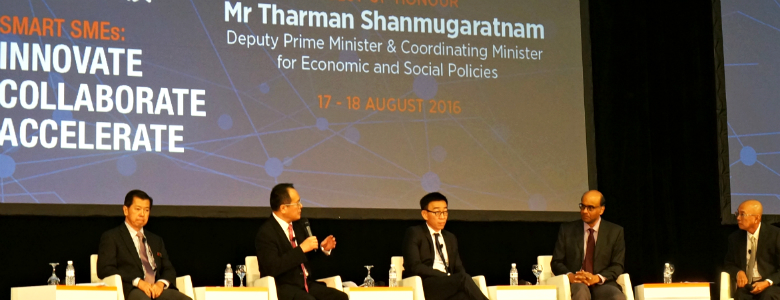Enthusiasm for Technological Innovation a Must for SMEs

To cope with a fast-evolving business landscape, Singapore hopes to nurture an enthusiasm for technological innovation, according to Mr Tharman Shanmugaratnam, Deputy Prime Minister and Coordinating Minister for Economic and Social Policies.
Mr Tharman was delivering the keynote address at the 18th Annual SME Conference, which was organised by the Singapore Chinese Chamber of Commerce & Industry and held at Suntec Singapore Convention & Exhibition Centre from 17-18 August 2016.
(The conference was held concurrently with the 19th Infocomm Commerce Conference and SME Expo 2016.)
A key aspect that Mr Tharman stressed was the need for small and medium-sized enterprises (SMEs) to recognise that technology is an unlimited resource for businesses to tap into. Smart technology in the form of manpower-saving robotics solutions, for example, could effectively enhance productivity at a whole-of-sector level.
And as productivity increases, so will a company’s growth.
Like how Singapore is investing in technology as part of its Smart Nation initiative, shifting towards a more productive, technology-enabled mode of operation could be crucial to the future growth of SMEs, Mr Tharman noted.
“We have not run out of ways to grow in Singapore, but we have to grow in a different way.”
Growing Businesses through Technology
To this end, public sector agencies have been working closely together to ease the way for SMEs seeking to stay ahead of the curve.
The Infocomm Development Authority of Singapore (IDA), in particular, is one agency leading efforts in this area. The Enhanced iSPRINT initiative, which has been in place since March 2010, supports SMEs’ use of technology by subsidising either packaged or customised technological solutions, depending on their needs.
“The IDA has worked with trade associations, government agencies and ICT partners to pre-qualify IT solutions,” Mr Tharman said. “We now have more than 60 sector solutions which are ready to go and very easy to use.”
These solutions can be applied to a wide range of industries such as food and beverage, construction, logistics and domestic services.
A current focus for the Enhanced iSPRINT is working towards wide-scale deployment of these productivity-enhancing smart tech solutions, specifically for consumer-facing industries such as food and beverage services and retail.
A good example: mobile-based order-and-pay solutions which alleviate the need for front-of-house service staff.
Fitting of the times is the adoption of autonomous robots that can do repetitive, labour-intensive tasks. These gadgets are not meant to replace the workforce but rather, help companies focus their valuable human resources on more meaningful, fulfilling work, said Mr Tharman.
IDA is also working with tech companies which, drawing from years of experience with industrial robots, are introducing service robots to the wider spectrum of business sectors.
Taking the form of security guards or teaching assistants, these robots are highly customisable and easy to maintain.
To date, the response from SMEs in Singapore has been very encouraging.
“For the past year, we have about 1,000 firms taking advantage of both enterprise and sector iSPRINT.”
However, despite the efforts of IDA and other government agencies, many SMEs still find it difficult to innovate, said Mr Tharman during a later dialogue following his keynote address.
The Human Factor
On the dialogue panel were Mr Yeo Hiang Meng, President of the Federation of Merchants’ Associations Singapore, Mr Andrew Tjioe, President of the Restaurant Association of Singapore, and Mr Ernie Koh, President of the Singapore Furniture Industries Council.
Acting as the moderator of the session was Mr Han Fook Kwang, Editor-at-large of The Straits Times.
“When you look at our economy, I would say about 60 percent has become fully innovative—outward-oriented, exporting, and competing with international firms. Times are tough now but productivity growth has been healthy for this sector in the last three to four years,” said Mr Tharman.
“The firms representing the other 40 percent are still struggling. We need some competition and disruptive change, and we need to match supply and demand.”
Furthermore, the minister noted, Singapore needs to strengthen the coordination between government, trade associations and the enterprises themselves, sector by sector, to encourage this spirit of innovation.
Another way to approach the issue would be to develop stronger relationships between large, more advanced companies and smaller ones, a point brought up by Mr Han. He cited countries like Japan, Taiwan and South Korea, where this model has worked very well.
In response, Mr Tharman explained that it is in the self-interest of both parties, large and small, to deepen this link based on innovation.
He pointed out examples of government schemes that are already addressing this.
The Local Enterprise and Association Development (LEAD) and LEAD+ Programmes, jointly administered by SPRING Singapore and IE Singapore, are aimed at improving industry competence and internationalisation.
To do so, the programmes provide grants to large multi-national corporations, incentivising them to work with small companies and help them improve.
Summing up the discussions, Mr Tharman drew the focus to what was most important: the very people whose lives productivity-enhancing technology is meant to improve.
His advice to SME owners and management professionals: Make sure the workplace is attractive to employees, which will in turn increase their productivity.
Something as simple as air-conditioning in a manufacturing workspace can make all of the difference in the world, he noted as the audience laughed.
But beyond superficial factors such as the working environment, the way people are valued must also be taken into account.
“When they join the firm, they must feel as if their career is in your interests too.”
https://www.tech.gov.sg/media/technews/enthusiasm-for-technological-Innovation-a-must-for-smes
